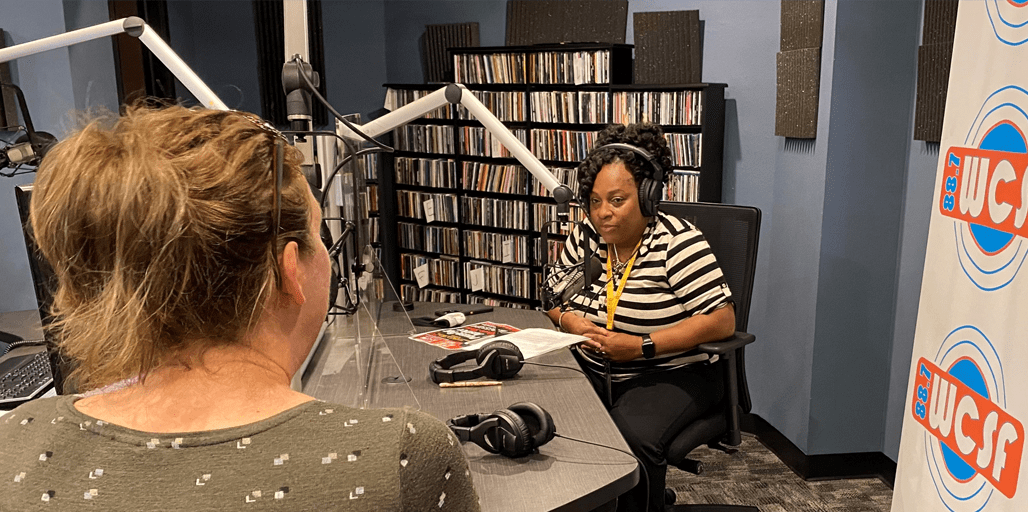Joliet, Ill. – As Joliet’s university, the University of St. Francis (USF) has a rich tradition of being dedicated to the facilitation of healing. The new Pause for Justice Radio Show, which airs every Wednesday on WCSF 88.7 FM and streams worldwide on
wcsf.streamon.fm, discusses social justice and equity through powerful conversations to promote healing.
While the show is still in its infancy, Allison Heard, the show’s host and USF Director of Institutional Diversity and Title IX Coordinator, already has several impressive guests lined up to appear throughout the coming months. Guests include: Joliet Region Chamber of Commerce’s new DEI Council chairs Mike Clark and Kristen Hamilton and Joliet Chamber president Jen Howard; Dr. Vishakha Desai, Senior Advisor for Global Affairs and Senior Research Scholar in Global Studies, Columbia University School of International and Public Affairs; David Masciotra, USF adjunct faculty member and author of “I Am Somebody: Why Jesse Jackson Matters”; global non-profit One Collective; and the Sisters of St. Francis of Mary Immaculate Anti-Racism Committee. The show, which is produced by WCSF station manager Anthony Musiala and USF social work intern Jewel Andy, will also feature several USF faculty members and other administrators.
On Wednesday, June 16, 2021, Pause for Justice will feature Stedman Graham, American educator, author, businessman, and speaker. Graham will speak about his book, Identity Leadership. As noted in Graham’s book, “Identity Leadership is self-leadership, based on the philosophy that you cannot lead others until you first lead yourself.” The discussion will explore ways that leadership is cultivated and nurtured as society imagines a world based upon justice and equity.
Heard credits the Healing Illinois grant that USF received earlier this year for helping to support the show’s creation and content.
“The Healing Grant allowed us to work with Anthony Musiala to help us design the outline for the segments and to train Institutional Diversity staff on the best format to present information in a credible format to listeners. Credibility is important which is why we want to work on information that is research-based and accurate. All of our guest speakers have agreed to volunteer their time and knowledge for free and we are so appreciative to them for the information they are willing to share,” she said.
Although the show launched one month ago, Heard said the idea and spirit behind this work actually originated last summer.
“Pause for Justice at USF was developed in June 2020 during COVID-19 when we were working from home due to the pandemic. I remember watching the many images on TV, listening to the news, reading articles online and feeling like I was on information overload. There was something to be upset and angry about every minute of the day. I think it is okay to be upset and angry but what is unbearable is feeling like you ‘have no power’ to do anything about it,” Heard said.
Heard added that the death of George Floyd on May 25 was a call for conversation and change.
“When the news broke about George Floyd, I remember getting a few text messages and some were notes of encouragement. A few people asked how I was doing. The natural inclination is to tell people you are okay but during that time, I had watched a video that was sent to me and a person in that video cried and said they were not okay. That is exactly what I was feeling. We are often programmed and taught to say we are okay when we are not. Progress and Change can only be actualized when there is room to grow. There were many people who were not okay. People who wanted to pray but who also wanted to do something. Pause for Justice became the medium for gathering, praying, learning, and aligning actions with emotions of the heart. The Pause for Justice Radio series was born out of this history,” she said.
Heard acknowledged that conversations on social justice and equity can create feelings of vulnerability, but she added that they can also result in a desire to act.
“Being vulnerable is often regarded as something negative but it can be very positive when our spirit is moved to a desire to help those who are less fortunate than us. The hope is that if people know better, they will do better. So many mistakes of the past is due to the fact that people don’t know history, or they are not able to critically analyze all of the information the world throws at them. The goal is to match education and information with a person’s inner desire to have a positive impact on society and to facilitate equity and justice for vulnerable populations, she said.
For more information on the show, contact Heard by email at
aheard@stfrancis.edu or by phone at 815-740-5025.
: :
The University of St. Francis, in Joliet, Ill., serves close to 4,000 students nationwide and offers undergraduate, graduate, doctoral and certificate programs in the arts and sciences, business, education, nursing and social work. There are over 52,000 USF alumni across the globe. For information, call 800-735-7500 or visit
stfrancis.edu.
University of St. Francis: Bigger thinking. Brighter purpose.
# # #

